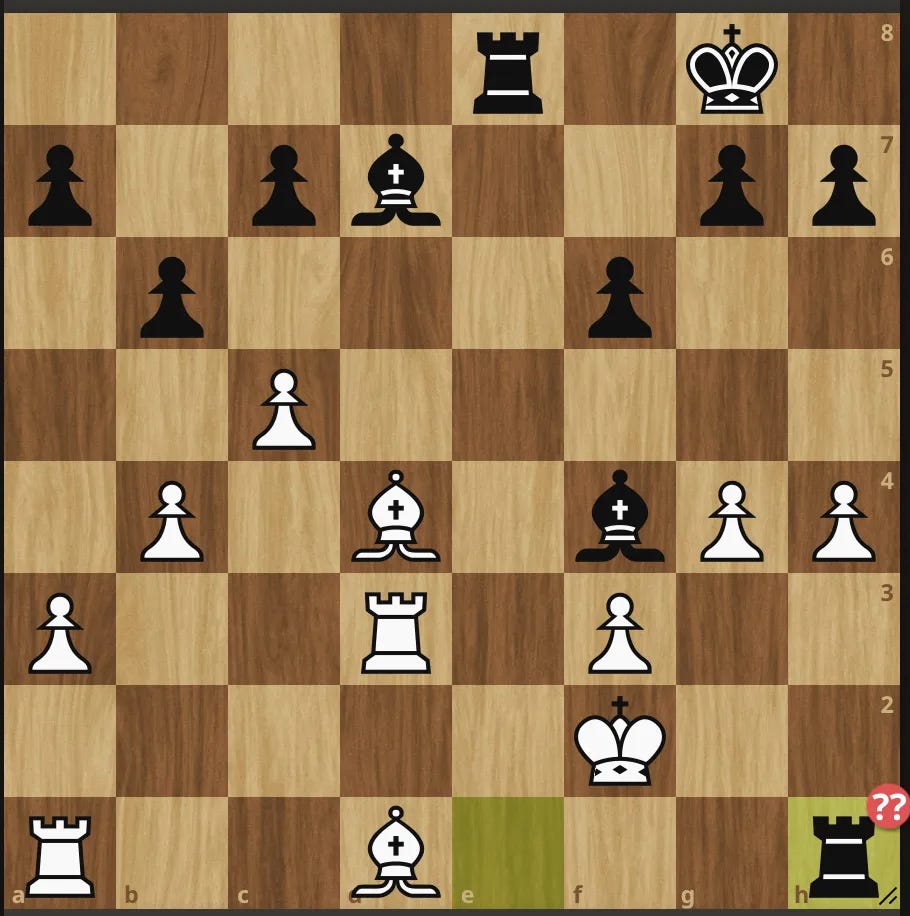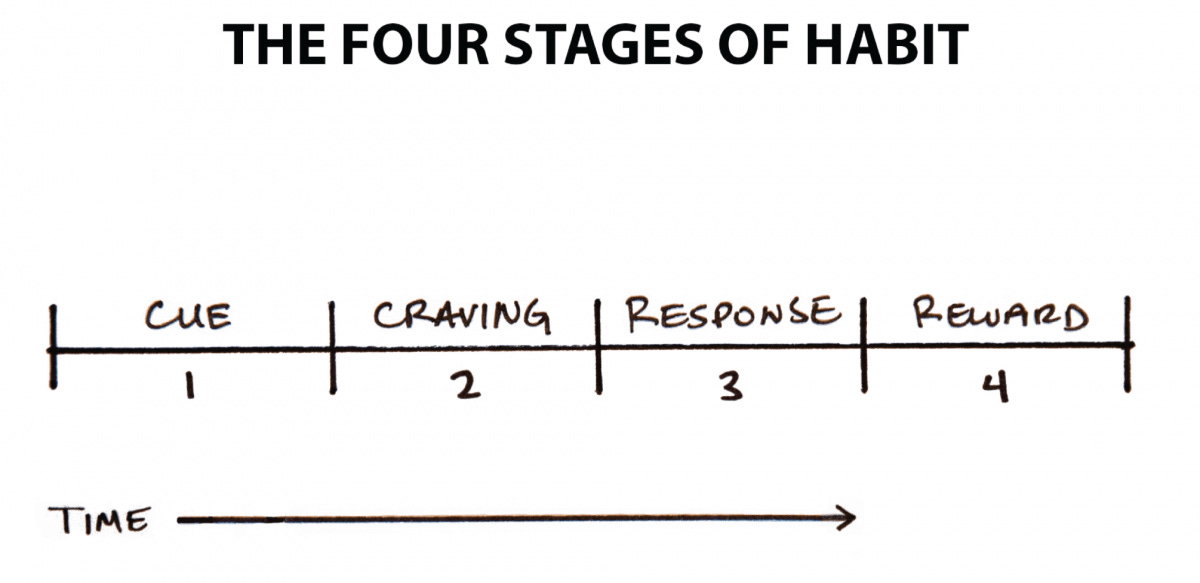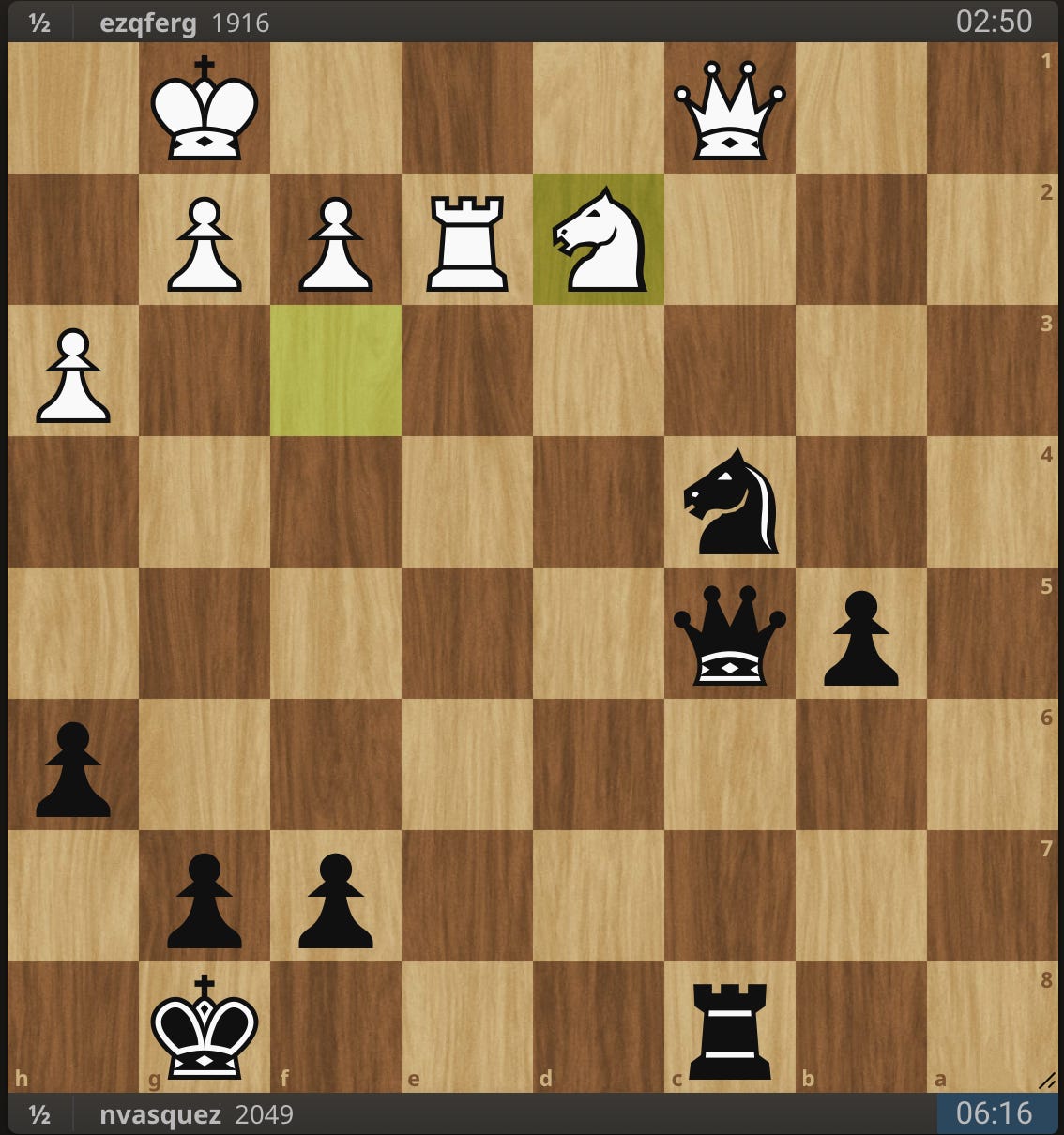How to Improve: Reducing Mistakes
Repeated mistakes are probably habits
Welcome back to Chess in Small Doses, a Substack for adult chess improvers. Today we’re going to finish the “How to Improve” series. We started with gaining knowledge by making it relevant to you. Next was practicing skills by using short, focused sessions spread throughout the week. Today, we’re talking about reducing mistakes. In my opinion, reducing your own mistakes is the single most powerful thing you can do to improve your chess and gain ELO. It’s also the most difficult. Let’s get into it.
Mistakes are universal
It’s March 2022, and I’m playing in an OTB tournament. I had the White pieces for my first game and sat down against an older man who frankly outplayed me until we got to this position. Then he blundered in one move.
What came next was Bb3+ unveiling the discovered attack on the h1 rook. When I played it he literally threw up his hands, made some very angry sounds, and resigned on the spot. He got up, walked over to the tournament director and withdrew from the tournament! It was about 20 minutes into Round 1.
Mistakes are universal. We all know that from experience. It is just part of the human condition that we have bounded rationality. We can only use the information we know, and we cannot know everything. Acting on incomplete knowledge is a recipe for inevitably being wrong. No one intentionally blunders. There’s just so much information to acquire in chess that it’s impossible to ever learn it all. Mistakes will be part of our chess likely for the rest of our lives. Conceptually we can understand this is true.
However, mistakes are also universally painful! Typically adults are intolerant of making mistakes. It often feels like a personal failure. I can remember thinking I should quit chess several times after a painful losses. In his recent Perpetual Chess interview, Omar Mills mentioned (at 1hr into the interview) being tied to his rating and struggling with self talk. He’s not alone. Most adults respond negatively to mistakes which is a pity since mistakes are our greatest opportunity to learn.
Chess will give us endless opportunities to discover how little we actually know. Every game there is something we can learn. But how we respond to this opportunity is the difference between growth and stagnation. If we analyze the game and try to learn what we missed, we can grow. If we avoid looking at our mistakes, we remain ignorant and will probably repeat the mistake. There is a very fine line between a mistake and a habit. Repeated mistakes are very likely habits you have formed.
"Bad habits are easy to form, but hard to live with. Good habits are hard to form, but easy to live with. And as Goethe said, ‘Everything is hard before it’s easy.’”
Brian Tracy
The Habit Loop
Habits form much of our behaviors daily. We often drive the same route to work, keep the same routines, eat the same food, drink the same drinks. We are creatures of habit because it’s easier on our brains. Through the same myelination process I mentioned last time, our brains turn effortful work into easy routine over time. Habits are neither bad nor good in that respect, they’re just repeated behaviors. But we’ve all had the experience of playing another blitz game instead of analyzing the last one. Or maybe instead of eating healthy, we eat candy or fried food. Or maybe it’s staying up late playing blitz instead of going to sleep at a decent hour. We all know what’s good for us but we often don’t do that. Why?
The answer is simple and elegant. Bad habits form because they are immediately rewarded. Dr. Thomas Rutledge wrote in a fantastic article on why that is.
We struggle to form good habits, therefore, not because of a lack of self-discipline or education but because we are biologically predisposed to repeat behaviors based on their immediate physical, social, and emotional consequences. This principle is true across the animal kingdom and likely predates humans by millions of years.
In other words, we take the easier path because it is more immediately rewarding. Let’s put this back in chess terms. We know that it’s better for our improvement to play and analyze slow games. However, many people play blitz or bullet instead because it is much more immediately rewarding. That reward sets up a habit loop.
Every time we sit down to play and analyze a slow game, we have the cue of “long struggle ahead”. Instead we crave rapid action or entertainment. If we respond by playing blitz or bullet, then the reward is there. Over time our brain simply turns this into a habit that we might even do without thinking.
It’s not about what we know, it’s about what we do. If you were to sit down and write out the habits of a “strong player” I doubt it would include long late night sessions of bullet (unless that player was Firouzja). If you were to make a list of habits a “bad player” might have you would probably come up with something similar to this book, this book, or even this one. Many authors have tried to make a list of common mistakes and the fixes for them. They’re trying to add knowledge when it would be more helpful to talk about habits.
In my opinion, common beginner mistakes are common because they are the easiest, most immediately rewarding ways to resolve the challenge of chess. Thinking is hard for the brain. It would rather not think deeply if it doesn’t have to. There is a literal metabolic cost to paying attention. Our brains were designed for brief episodes of focus and then periods of rest. During that rest, our brain recharges by letting the focus wander. It’s called Default Mode Network. We experience it as autopilot, or day dreaming. I’ll write more on this in a later post. The key to understand here is that our brains resist thinking and focusing, and it requires energy to engage the brain in complex problems solving like chess. Our default is to take the short cut and rely on a habit, even if that habit is a bad one.
“The difference between an amateur and a professional is in their habits.”
Steven Pressfield
Changing Habits
My repeated mistakes are familiar to me. I often play too fast, leaving time on the clock that could have been used to find a better move in a critical position. I often think only of my move, and not of what my opponent might do in response. I often don’t fully consider why my opponent played their last move. Lastly, and perhaps most importantly, I often only think about why a move will work and not why it won’t. Take this position for example.
White has played his knight to a place where I can take it. I have 6+ minutes on the clock in a Rapid game and I played Nxd2 in less than 10 seconds. I believed it led to a win. I never considered that Re8+ pulls the c8 Rook away from my Queen. Oops. My habit of “see move, make move” bit me. All I needed to do was look a little longer at the position and I would have seen it but my brain felt that was too much effort apparently. If my bad habits develop because my energy efficient brain will stop at “close enough” how can I ever improve? How can I change my habits?
“What is immediately rewarded is repeated. What is immediately punished is avoided.”
James Clear in Atomic Habits
Habits take hold when they are rewarded. Changing our habits is about changing the rewards. By intentionally creating rewards for a new behavior in response to the same cue, we can shift our behaviors. For me this is quite possibly the single most powerful thing an improver can do.
Let’s take one of my bad chess habits and the above position where I played Nxd2. My habit is that I don’t always consider my opponent’s best response. It’s not that I don’t see them, it’s that I don’t stop to notice. My image of a strong chess player is someone who takes their time after their opponents move and considers the best response only after understanding everything that has changed. This is the kind of player I want to become. The new habit then would be note what my opponent’s move does and undoes after every move.
Now I just need to make a new reward system for the behavior with both extrinsic and intrinsic rewards.
Identity: Keeping that image of a strong player in my mind, I will notice every time I play like that. Each time I do I feel I am becoming that stronger player.
Making a mark: Gold stars or physical marks on paper really help here. Keeping a journal right next to where I play allows me to track how often I used this habit in game.
Positive self talk: Compliment myself whenever I spend time on my opponent’s last move. For whatever reason, I have the sound of a Russian chess coach in my head saying “You are good player”.
Visualization: I’ll spend a few minutes before each game visualizing myself as that strong player. It’s a key habit for top athletes and one I suspect will help me as well.
Game Analysis: Review the games and note when I did and did not use the habit.
Rating gains: It’s a little controversial for me, but watching hard work turn into rating gains can be rewarding. Playing my best chess will usually result in gaining points. I just can’t forget the keep the self talk positive even if I lose some points.
These are just some examples of both extrinsic and intrinsic rewards I can use to cement a new habit. There are so many options, but the rewards need to be immediate.
“This is the real power of habit: the insight that your habits are what you choose them to be.”
Charles Duhigg in The Power of Habit
Taking Charge
Let’s sum up what we’ve learned here. Everyone makes mistakes. Chess is a difficult game and all of us have experienced terrible blunders and mistakes. Our natural inclination is to get upset and react negatively rather than accepting the mistake. Mistakes are our greatest opportunity to learn and improve, but our negative emotional reactions prevent that growth. Mistakes that get repeated are probably because of habits we’ve formed. Habits form when a cue results in a behavior that is reinforced by reward. It is my opinion that common chess mistakes are common because they are the easier, more immediate rewarding response. Since we know how habits form, we can take control of our mistakes and change our habits.
The first step is to identify a habit you want to change. For me it’s moving too fast before I understand what’s changed. Then, identify the cue for the behavior. In this case it’s when my opponent makes a move. Next, define the new behavior you want to create (spend time identifying all the things a move undoes and does). Lastly we create a new reward system for the behavior with intrinsic and/or extrinsic rewards. Make sure they are timely rewards so the new behavior is reinforced.
For many of us however, the most powerful rewards are the intrinsic ones. In his book Drive, Daniel Pink showed that intrinsic rewards were more motivating than extrinsic one. Whatever reward system you set up, work hardest to create intrinsic rewards that are meaningful to you.
Thank you for reading. I’ve really enjoyed writing this whole series of How to Improve and I sincerely hope you’ve gotten something from it. As always I would love to hear your comments. Until next time, wishing you luck with your chess.
P.S. If you want to read more on habits, here are some good books to explore.





I’m currently reading the book Tiny Experiments: How to Live Freely in a Goal-Obsessed World, and the message here aligns. Thank you for this attention given to the psychological aspects of this game (which mirror our psychology more generally, so well).
✅ Really appreciated this one — especially the idea that reducing mistakes often comes down to reducing friction. That clicked differently after I took the Archetype6 quiz and realized I’m an Architect. I’d been over-engineering my routines and missing simple fixes that actually reduce errors.
Here’s what helped me improve:
1. I now design for ease of execution first, not just clever systems.
2. I review habits in context — where and when the mistake tends to happen.
3. Learning from other Architects showed me that simplifying isn’t laziness — it’s strategy.
Has anyone created a “pre-mistake” checklist or trigger that works without adding complexity? Still working on getting that balance right.